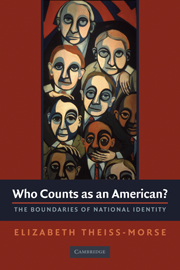Book contents
- Frontmatter
- Contents
- List of Figures
- List of Tables
- Preface
- 1 The Need for a Social Theory of National Identity
- 2 Commitment to the National Group
- 3 The Setting of National Group Boundaries
- 4 The Desire to Help the National Group
- 5 Loyalty in the Face of Criticism
- 6 Is National Identity Good or Bad?
- Appendix
- References
- Index
1 - The Need for a Social Theory of National Identity
Published online by Cambridge University Press: 05 June 2012
- Frontmatter
- Contents
- List of Figures
- List of Tables
- Preface
- 1 The Need for a Social Theory of National Identity
- 2 Commitment to the National Group
- 3 The Setting of National Group Boundaries
- 4 The Desire to Help the National Group
- 5 Loyalty in the Face of Criticism
- 6 Is National Identity Good or Bad?
- Appendix
- References
- Index
Summary
Throughout the Iraq War, and even prior to its inception in March 2003, some Americans vigorously criticized the Bush administration for various aspects of the war, protesting that the reasons for starting the war were based on faulty intelligence; that the United States should have put together a strong, broad-based multinational force; that the administration had no real plan for what to do in Iraq once Saddam Hussein and his government fell. Counterprotesters and people who supported the Bush administration's foreign policy responded to these criticisms by calling the protesters “un-American” or “bad Americans” (O'Reilly 2007; “Pro-war Demonstrators Show Support for U.S. Troops” 2003; “Thousands Rally in Support of War” 2003). By implication, good Americans do not criticize, especially during times of war. If Americans do not like a policy being pursued by their government, they should remain silent or, at more of an extreme, move to another country, Canada perhaps, because they clearly aren't behaving like true Americans.
In the midst of the Iraq War, on August 29, 2005, Hurricane Katrina wreaked havoc on the Mississippi Delta region of the United States. Reactions to the U.S. government's response to the widespread destruction varied widely, with some people defending the government's response and others questioning whether the government would have responded as slowly if the majority of the hurricane's victims had been wealthy and white rather than poor and black.
- Type
- Chapter
- Information
- Who Counts as an American?The Boundaries of National Identity, pp. 1 - 32Publisher: Cambridge University PressPrint publication year: 2009



